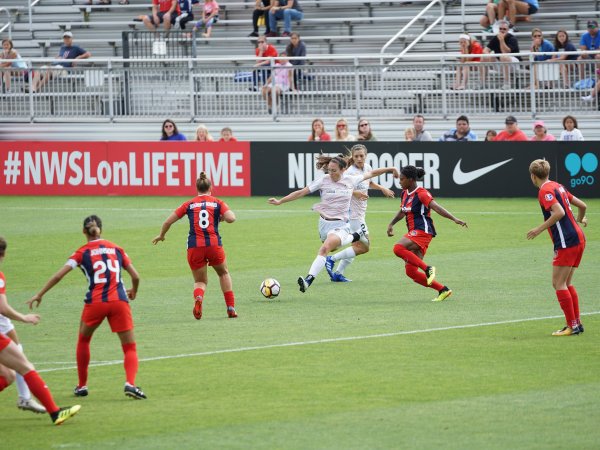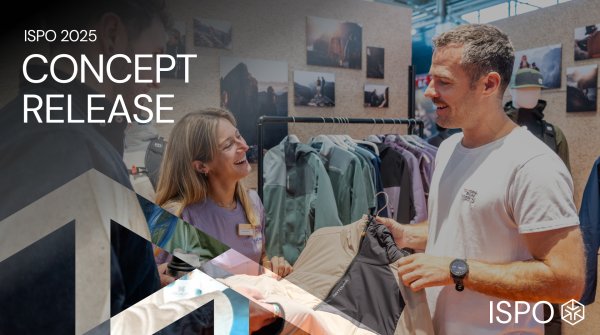- Growth driver commercial revenue
- Women's sport: Historically lagging behind
- Gender pay gap in elite sport
- #ChangeTheGame: Parity at the Olympics at last
- Olympic hopes - these are female
- Rising streaming figures for women's sport
- Women show: Media worldwide have a duty
- Calls for equal distribution of sponsorship money
- Women in focus: from Under Armour to Ryzon
- Sponsorship in women's sport pays off sevenfold
- Double team deals are setting a precedent
- Customers love brands that sponsor women's sport
According to the Deloitte forecast, a sharp increase in commercial revenue (club sponsorship, partnerships and merchandising sales) is currently the biggest growth driver in women's professional sport - with estimated total revenue of USD 696 million. This is followed by income from broadcasts (USD 340 million) and match days (USD 240 million). The largest market is still North America (52%), followed by Europe (14%).
The two most valuable sports are expected to be soccer (43%) and basketball (28%). And: global competitions generate the most revenue. The consultancy firm mentions the FIFA Women's World Cup, the Ladies Professional Golf Association (LPGA) Tour and the Women's Tennis Association (WTA) Tour. They are expected to contribute 425 million US dollars (33 percent) to the forecast total volume.
Of course, we are celebrating the breaking of the one billion US dollar mark in revenue for female professional sport. Nevertheless, revenue in male professional sport has only been going in one direction for years - upwards. We are talking about an estimated 64 billion US dollars in 2023.
In 2024, women's professional sport will continue to benefit from the multi-faceted success of the FIFA Women's World Cup 2023, according to the consulting firm Deloitte, which estimated revenues of more than 570 million US dollars. Even though women's elite sport is developing rapidly, it is still in the early stages: the consultancy firm cites the fact that many of the major leagues are very young and that a mainstream culture around women's elite sport has yet to develop in many countries. Hans-Willy Brockes, founder of the ESB Marketing Network, agrees: Women's sport had "less importance culturally and historically and is still not promoted in some societies today." This lagging behind cannot be made up for in just a few years, but is a generational issue.
"The gender pay gap is not just about sponsorship, but also about bonuses and employment contracts for professional athletes. First of all, you have to say in general that there are huge pay gaps in sport," Brockes states. According to him, these exist in particular between sports: soccer on the one hand and volleyball, field hockey or artistic gymnastics on the other. This raises the question of the justification for the pay gap. "The answer is market rationality. Supply and demand exist in sport and also in sports sponsorship. Both in terms of athletes (employment contracts) and performance (TV ratings/social media followers) or the marketability of sponsorship and ticket sales."
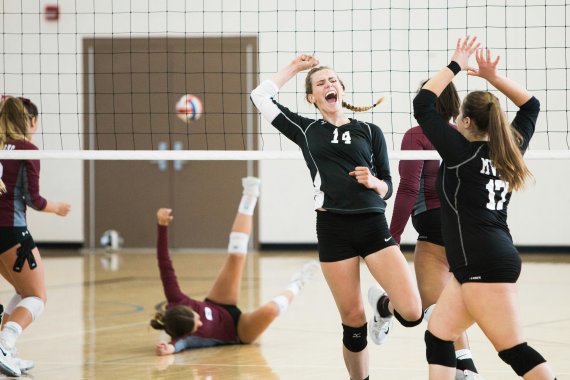
According to UN Women, for the first time in history, there will be as many female athletes as male athletes competing at the 2024 Olympic Games in Paris. This means that sports fans around the world will see more women than ever before presenting their sports and, of course, the respective brands at world level. When women were allowed to take part in the modern Olympic Games for the first time in 1900, they accounted for 2.2 percent of all participating athletes. This milestone is thanks to the tireless efforts of female athletes who are breaking records, overcoming stereotypes and inspiring future generations.
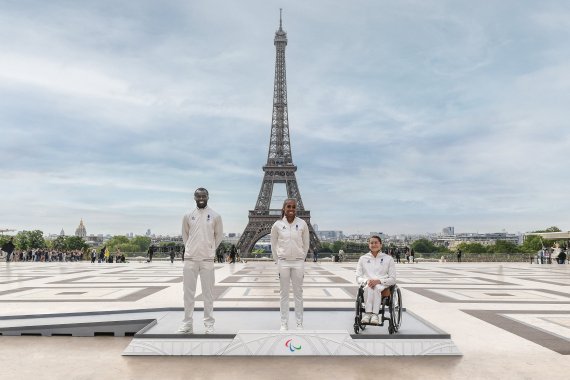
The young US company Sponsor United, which operates a global sports and entertainment SaaS platform, cannot get past female stars in an analysis in the run-up to the Olympic Games. On the contrary. It names three successful US female athletes who shine with their sponsorship contracts and social media followers: Gymnast Simone Biles, tennis player Coco Gauff and swimmer Katie Ledecky. The Athleta brand, itself brand new to Olympic sponsorship, is certainly delighted. Gap's premium performance lifestyle brand from the USA is relying on Simone Biles as a brand ambassador for its "Power of She" platform to support athletic women and girls. The campaign also features Katie Ledecky.
Also in the spotlight: British skateboarder Sky Brown - just 16 years old. Sponsor United calls her a "trailblazing global athlete".
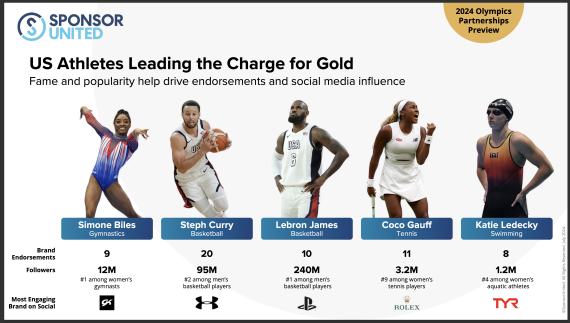
Not only is the 2024 Olympics setting records, but the visibility of women is also (slowly) improving. The UK Women's Sport Trust's latest study into the visibility and popularity of women's sport concludes: "This report points to unprecedented streaming figures in the digital space as well as record usage of videos of leading women's sport competitions on social media channels," said Tammy Parlour, CEO and co-founder of the Women's Sport Trust. "The industry needs to seize these opportunities to further increase awareness and engagement so that we can continue to grow the audience for women's sport and reach fans where they are."
How are teenage girls, young women and best agers supposed to perceive female role models if they pursue their sport unnoticed by the media? Participants in a survey conducted by the German sports marketing agency ONE8Y named more coverage of women's sport (53%) as the most important way of getting female fans more involved in sport. This was followed by the desire for more female commentators (38%) and more events specifically for women (37%). ESB boss Brockes says: "That says it all. The interest is not (yet) being met. And so you also have to scold the media. They are also 'somewhat' to blame..."
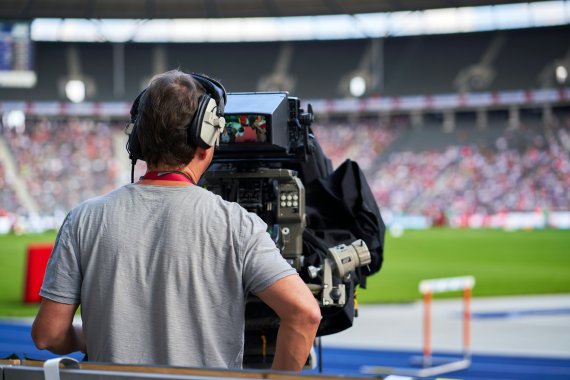
"We have set ourselves the long-term goal of distributing investments in male and female professional sport equally. The proportion of contracts with female athletes has been rising steadily for years," says an Adidas company spokesperson. The German global company also knows: "The media presence and public perception of sport is largely focused on male athletes. We have made it our goal to promote equality in sport and to be present in women's sport with our brand."
Other brands also recognize the value of young, marketable professional female athletes. Forbes magazine mentions Angel Reese and Cameron Brink in the WNBA, Nelly Korda and Rose Zhang in golf and Iga Swiatek, Coco Gauff and Aryna Sabalenka in tennis. According to a recent analysis by Sponsor United, Swiatek is in third place worldwide in terms of brand engagement in social media behind the two basketball players Giannis Antetokounmpo and Stephen Curry.
Under Armour has been consistently focusing on female testimonials for some time now. The US company launched its first global advertising campaign aimed specifically at women back in 2014. Ballerina Misty Copeland, Olympic soccer gold medal winner Kelley O'Hara and professional surfer Brianna Cope were delighted to receive sponsorship money. Now comes the next big thing: in June 2024, USA Football, the governing body of football in the USA, and the organization responsible for the formation and management of the US national teams announced a multi-year partnership until the 2028 Summer Olympics. The aim of the partnership is to enable all athletes (male and female) to participate and to promote football. Smaller sports companies also rely on the appeal of female athletes: The still young German sportswear brand Ryzon currently sponsors eight professional female athletes (and nine professional male athletes). The first to put on Ryzon clothing was Imogen Simmonds, British-Swiss triathlete and European Ironman champion in 2019. She is still on board. The latest coup: current Ironman world champion Lucy Charles-Barclay has been under contract since April 2024.
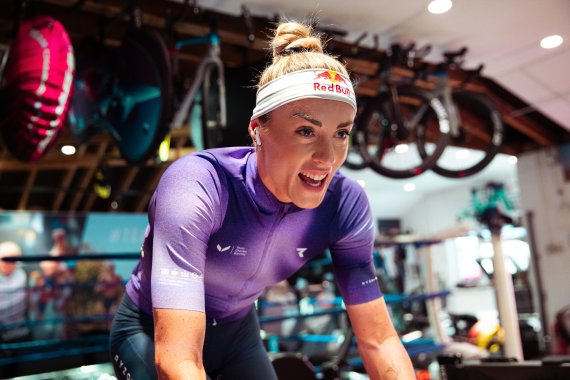
The value of sponsorship in women's elite sport is likely to increase rapidly by the end of 2024, predicts Deloitte. The reason: impressive recent evidence of return on investment. According to one study, for every dollar spent by a corporate sponsor in women's sports, more than seven dollars in "customer value is generated for that organization." Some sponsors of the Ladies Professional Golf Association (LPGA) reported a return of up to 400 percent of the media value of their investment. Between 2019 and 2023, the LPGA also doubled the number of active brands on its sponsor list, and in June 2023 the number of sponsors exceeded the 1,000 mark for the first time. ESB CEO Brockes also sees "momentum for women's sport". Soccer is definitely benefiting from this. It is particularly noteworthy that new sponsors such as Vorwerk and Stepstone are getting involved in this way. "But I also see good demand from sponsorship partners in tennis, golf and Nordic winter sports."
In its latest market report, Sponsor United also sees an upturn in women's sponsorship and explains this in part with double-team deals, for example in the English capital London. According to the results, men's teams have an average of 42 sponsors ("a modest increase" of 2.5% compared to 2022), while women's teams are on the rise with an increase of 35% since 2022. This increase in women's sponsorship deals is partly due to the growing trend towards bundled sponsorship deals. For example, according to Sponsor United, 79% and 88% of sponsors of Arsenal and Tottenham Hotspur's women's teams respectively are also partners of the men's teams. These results would suggest that brands are increasingly recognizing the value of sponsoring two teams and are using both the men's and women's teams to maximize market reach and engagement.
It is not only the higher return on investment that speaks in favor of sponsoring female professional sport, but also a better image: The British Women's Sport Trust found that 29 percent of consumers have a more positive opinion of companies or brands that support women's sport through their sponsorship, twelve percent more than for campaigns that support men's sport. In addition, women-only sports contracts have been shown to be popular due to their ability to attract new audiences and increase brand affinity. Tammy Parlour from the Women's Sport Trust: "This new study clearly shows the positive impact brands can achieve when they invest in sponsoring women's sport."
 Sports BusinessAI in online retail: 8 opportunities for sports retail
Sports BusinessAI in online retail: 8 opportunities for sports retail Sports BusinessKickstarter campaigns: Why Doubledeck Snowboards relies on it
Sports BusinessKickstarter campaigns: Why Doubledeck Snowboards relies on it
- Awards
- Mountain sports
- Bike
- Fitness
- Health
- ISPO Munich
- Running
- Brands
- Sustainability
- Olympia
- OutDoor
- Promotion
- Sports Business
- Textrends
- Triathlon
- Water sports
- Winter sports
- eSports
- SportsTech
- OutDoor by ISPO
- Heroes
- Transformation
- Sport Fashion
- Urban Culture
- Challenges of a CEO
- Trade fairs
- Sports
- Find the Balance
- Product reviews
- Newsletter Exclusive Area
- Magazine
